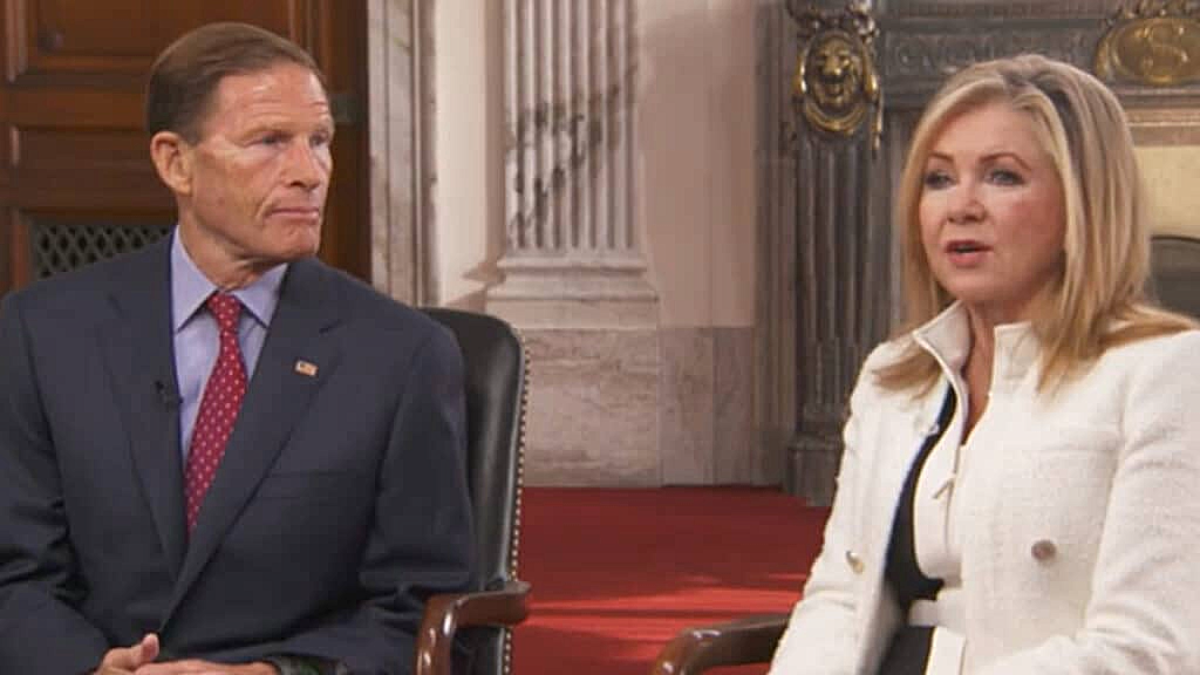Will Congress Resolve Tensions Over the Kids Online Safety Act in 2024?
María P. Angel / Dec 21, 2023
Senators Richard Blumenthal (D-CT) and Marsha Blackburn (R-TN), sponsors of the Kids Online Safety Act.
Despite having delayed the start of its holiday break, the US Senate finally adjourned on Wednesday, without having scheduled a vote on the Kids Online Safety Act (KOSA). Back in November, US Sen. Maria Cantwell (D-WA) was said to be pursuing a “hotline” process in order to obtain unanimous Senate approval for the bill. Immediately following this revelation, however, Senator Ron Wyden (D-OR) announced his intention to refuse any unanimous consent request to move forward with KOSA, until the bill was amended to prevent state attorneys general from attacking important reproductive and LGBTQ+ content.
At face value, it appears that the fate of KOSA will turn on whether, early next year, legislators are able to come up with a draft that eases current tensions with advocates concerned about its effects on the LGBTQ+ community. Nevertheless, a closer examination of the last few years’ debates surrounding children’s online privacy and safety regulation in the US reveals that this is only one of at least three underlying tensions that remain unresolved.
The first is the tension between authoritarian and progressive parental logics. Sponsors of laws such as the Utah Social Media Regulation Act and members of extremist conservative groups like Moms for Liberty seem to follow a dangerous authoritarian approach, which prioritizes parental control and authority. According to this logic, parents should have full control over what content their children and teens are exposed to and should be able to monitor every aspect of their online activities. In contrast, youth advocates and parents who see their role as nurturing children into adulthood tend to emphasize the importance of agency, education, empowerment, and role-modeling as opposed to restrictions, rules, and surveillance. American society has historically been at odds over which path it should take.
The second underlying tension relates to the current concerns of Senator Ron Wyden and revolves around what “the best interests of the child” actually entails. Outside of the US, several experts consider that this principle should be interpreted in light of the UN Convention on the Rights of the Child’s 3Ps (Protection, Provision, and Participation). According to the Convention, which has not yet been ratified by the US, children not only have the right to be protected from harm, but also the right to access information, and to actively participate in shaping their own online experiences. Within this framework, public authorities should ensure that, in all actions concerning children, every child has privacy protections, freedom from economic exploitation, and access to vital information, association with others, and play. Unfortunately, the “culture war” surrounding what material is available in schools and libraries in the US—alongside the parental rights movement—has given these discussions a different flavor. According to some individuals—such as Sen. Marsha Blackburn (R-TN), one of KOSA’s sponsors—protecting children’s best interests involves safeguarding them from information that, in their opinion, will lead to moral decline.
Finally, the third tension is about the role that technology should play in these dynamics. For those familiar with scholarly legal discussions, this could be described as the old tension between “code as law” and “code as speech.” Both a coalition of organizations called Designed with Kids in Mind and a coalition of young activists called Design It For Us seem to see technology as a key point of intervention. They seek to require Internet platforms to use design to prevent or mitigate online risks for children and teens. In contrast, commentators such as Santa Clara law professor Eric Goldman are of the view that all online design “features” should be seen as speech, therefore protected under the First Amendment. Already a point of contention in the legal battle over California’s Age-Appropriate Design Code Act, if this tension is not adequately discussed during the legislative process, it is likely to complicate the fate of these laws in court.
To be clear, these tensions are not the only ones underpinning these public policy discussions. There is, for example, another pending discussion concerning the imposition of age-verification requirements and the type of Internet we wish to have as a society. Yet, these three tensions currently appear to be the most divisive among stakeholders on both sides of the issue.
We should, of course, celebrate the fact that the Senate is taking the LGBTQ+ community’s concerns seriously. As a minimum, I hope that these negotiations result in the removal of KOSA’s Section 3, which establishes a duty of care that would pressure tech companies to censor critical information such as sex education or resources for LGBTQ+ youth. But there is still much more to be discussed by legislators. Current conversations about children’s online privacy and safety in the US would benefit from a deeper and more honest discussion of all three tensions mentioned above. In that way, American society would be better able to understand what is truly at stake when it comes to passing KOSA and similar legislation.
Authors
